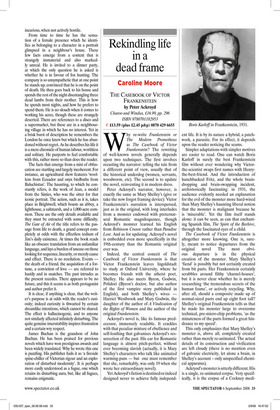A far cry from Paradise
Anita Brookner
THE GATE OF AIR: A GHOST STORY by James Buchan Quarcus, £14.99, pp. 224 ISBN 9781847244673 ✆ £10.39 (plus £2.45 p&p) 0870 429 6655 This strange novel is described as a ghost story, although it reads like a nervous breakdown in which both writer and reader are embedded. So constricted is the narrative that the central figure, Jim Smith, delivers no opinion of his own, although his past life appears to have been full of incident: extensive travel, a business career, apparently successful, in London, a certain level of worldly experience which has vanished, leaving him without attachments or points of reference. He has, for no apparent reason, bought a house, Paradise Farm, in an unspecified part of the country, and proposes to live there without company, devoting himself to farming his land and tending his animals, his only help that of an almost silent handyman and a cleaner, both of them taciturn and incurious, when not actively hostile.
From time to time he has the sensation of a female presence which he identifies as belonging to a character in a portrait glimpsed in a neighbour’s house. These few facts emerge from a context that is strangely immaterial and also markedly unreal. He is invited to a dinner party, at which the only question he is asked is whether he is in favour of fox hunting. The company is so unsympathetic that at one point he stands up, convinced that he is on the point of death. He then goes back to his house and spends the rest of the night disentangling three dead lambs from their mother. This is how he spends most nights, and how he prefers to spend them. He is no slouch when it comes to working his acres, though these are strangely deserted. There are references to a disco and a supermarket, but these are in a neighbouring village in which he has no interest. Yet in a brisk burst of description he remembers the London he once knew but which he has abandoned without regret. As he describes his life it is a mere chronicle of human labour, worthless and solitary. He purports to feel comfortable with this, rather more so than does the reader.
The facts that emerge from a mist of obfuscation are startling and largely incoherent. For instance, an agricultural show features ‘woollens from Ecuador and onyx birdbaths from Baluchistan’. The haunting, to which he constantly refers, is the work of Jean, a model from the Sixties, who was the sitter for that iconic portrait. The action, such as it is, takes place in Brightwell, which boasts an abbey, a lighthouse, a saltmarsh, and a 1,000-acre common. These are the only details available and they must be extracted with some difficulty. The Gate of Air of the title refers to the passage from life to death, a grand concept completely at odds with the effectless tedium of Jim’s daily existence. At times the book reads like an obscure translation from an unfamiliar language, and lays a burden of unease on those looking for sequence, linearity, or merely cause and effect. There is no resolution. Events — the death of a friend, the acquisition of a fortune, a conviction of love — are referred to hastily and in snatches. The past intrudes as the present recedes. There appears to be no future, and this it seems is as both protagonist and author prefer it.
It is clear, if anything is clear, that the writer’s purpose is at odds with the reader’s curiosity; indeed curiosity is thwarted by certain dreamlike intentions, which cannot be shared. The effect is hallucinogenic, and to anyone not similarly affected infinitely disturbing. The quite genuine inscrutability inspires frustration and a certain wry respect.
James Buchan is the grandson of John Buchan. He has been praised for previous novels which have won prestigious awards and been widely translated. Why he wrote this one is puzzling. His publisher hails it as ‘a fireside spine-chiller of Victorian rigour and an exploration of disturbed modernity’. It is perhaps more easily understood as a fugue, one which retains its disturbing aura, but, like all fugues, remains enigmatic.



































































 Previous page
Previous page